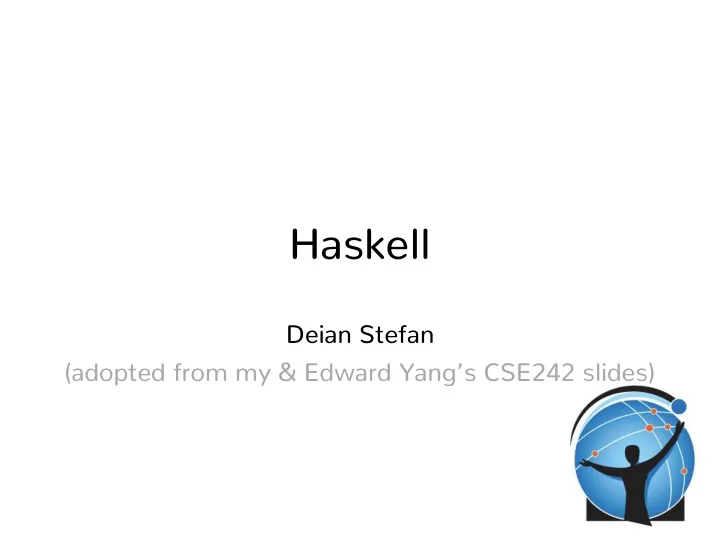

Haskell Deian Stefan (adopted from my & Edward Yang’s CSE242 slides)
Why Haskell?
The great ideas [Haskell] Expressive power (say more with less) Pattern matching First-class functions Exception handling Type inference Continuations Monads Reliability and reuse Type classes Type polymorphism Objects & inheritance Modules Cross-cutting concerns Concurrency Memory management
What is Haskell? a typed, lazy, purely functional language
Haskell is statically-typed
Haskell is statically-typed • Everything has a type • Everything must make sense at compile time ➤ Unlike JavaScript where f(x) with f=undefined will not complain until you actually evaluate f(x) • Is JavaScript typed? ➤ A: yes, B: no
Why is this cool?
Why is this cool? • Removes whole classes of bugs • Address bugs early vs. after they have been triggered ➤ Prevent weird errors from creeping up on you ➤ Important for safety, security, and compositionally • Easier to optimize and write faster code ➤ You can remove your typeof checks; compiler can do fast things. V8 relies on types to makes things fast!
Haskell is functional • This means no“side-effects”? ➤ A: yes, B: no
Haskell is functional
Haskell is functional • Support for high-order, first-class functions • Meaning of programs centered around: ➤ evaluating expressions ➤ not executing instructions
Haskell is pure
Haskell is pure • Expressions (e.g., functions) don’t have “side effects” ➤ Is JavaScript pure? A: yes, B: no • Everything is immutable: mutation is a side-effect! • What does it mean for an expression to not have side- effects? ➤ In scope where x 1 , …, x n are defined all occurrences of e (where FV(e) = {x 1 , …, x n }) have the same value
Why is this cool? Don’t take it from me, take it from Backus
Why is this cool? • Algebraic laws: equational reasoning & optimizations ➤ Can always replace things that are equal, λ calculus! • Easier to think about ➤ e.g., don’t need to worry if x changed after calling f • Parallelism ➤ Can evaluate expressions in parallel!
Haskell is lazy
Haskell is lazy • You don’t evaluate an expression until its result is absolutely necessary: in contrast to JavaScript ➤ Remember: call-by-name • Haskell’s evaluation strategy is called call-by-need ➤ Because of the other properties: you actually only evaluate an expression once and cache the result
Why is this cool?
Why is this cool? • Can define your own control structures using functions ➤ E.g., defining if-then-else is much easier in Haskell can be done naturally; less so in JavaScript; why? • Can define infinite data structures ➤ E.g., infinite lists, trees, etc. ➤ Can solve general problem and then project solution
Haskell is a committee language
Why is this interesting? [SPJ] . . . , y b u R Practitioners , t p i r 1,000,000 c S a v a J , + + C 10,000 , C 100 Geeks 1 1yr 5yr 10yr 15yr
Why is this interesting? [SPJ] Practitioners 1,000,000 10,000 100 Geeks Research 1 languages 1yr 5yr 10yr 15yr
Why is this interesting? [SPJ] Practitioners 1,000,000 10,000 100 Successful research Geeks languages 1 1yr 5yr 10yr 15yr
Why is this interesting? [SPJ] Practitioners 1,000,000 10,000 100 Geeks 1 Committee languages 1yr 5yr 10yr 15yr
Why is this interesting? [SPJ] Practitioners 1,000,000 10,000 Haskell 100 Geeks 1 1yr 5yr 10yr 15yr
intro.hs
Recommend
More recommend